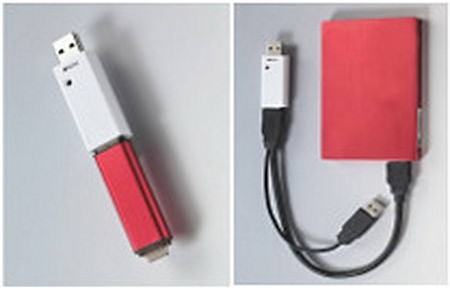These encryption adapters are not to be confused with encrypted USB thumbdrives, the dongles do not store any data themselves, they are are simple hardware devices with a cryptochip to perform the encryption process making data only accessible using the dongle.
The USB ciphering dongle sits in between a USB host (desktop computer) and a USB device (thumbdrive, external HDD, blu-ray, etc), encrypting all data going through it before writing everything on the external device, there is no need to install drivers and no software is involved, encryption is hardware based with little performance issues, the dongle will work in any operating system.
In addition to desktop computers these devices can be used to encrypt data in tablets and smartphones as long as a USB port is present
Enova Enigma USB
NIST (National Institute of Standards and Technology)/CSE (Communications Security Establishment) certified, using hardware AES-256 ECB/CBC encryption strength. Data written to the USB drive through the Enova Enigma dongle is automatically encrypted and decrypted when read out from the drive, requiring no additional hardware or software.

It works in Windows, Mac, Linux and Android but configuration can only be done in Windows and data can not be encrypted in place you will have to start from zero wiping everything. USB3 compliant, there is more than one model, AES128/256bit in ECB or CBC mode, Cipher Block Chaining with AES256 is the most secure dongle, all models are strong enough to withstand state sponsored attackers but AES256 in CBC mode should buy you more time in case of future cryptographic breakthroughs.
A recovery password of up to 32 characters can be set up and used if you lose the device. A “Write-Protect” function protects the USB stick from malware infections, FIPS 140-2 certification of the crypto module is in progress.
Addonics CipherUSB
Hardware-based, FIPS-certified AES 256-bit encryption, strong enough to protect top secret information in Government agencies, it does not require software or driver installation, operating system agnostic (Windows, Mac, Linux, Solaris, BSD), it can encrypt Blu-Ray, DVD or CD discs using an external burner connected to the dongle.
It is not possible to encrypt content already in place, you will have to format the drive first and restore the data.

CipherUSB can be daisy-chained, if you insert two or more devices together to encrypt a drive it will be impossible to decrypt it again unless it is using the same two chained devices, this allows you to split the decryption keys in between more than one person.
The enclosure is made of plastic but tamper resistant, preventing opening of the unit without destroying the plastic housing, a power/activity LED will show that everything is working as expected. There is no backdoor but you have the option of inserting a recovery password of up to 32 characters long, if you lose your device you can buy a new one and decrypt the data using this recovery password, if you do not set it up the data would remain undecipherable.
CipherUSB can be used for full disk encryption, including the Master Boot Record, encrypted disks will show as blank when viewed.
Conclusion Enova Enigma vs CipherUSB
After looking at the specs, both encryption adapters are equally secure, certified and fast, there is little difference in between them, Enova Enigma has the unique “read only” feature that stops malware from installing into the USB but CipherUSB specifically mentions on its page that they have no backdoor, Enova Enigma does not confirm nor deny anything about backdoors, this is an important piece of information that all security vendors should make clearly visible.
I would probably go for CipherUSB if I had to buy one of them, CipherUSB is slightly cheaper and I would get peace of mind about no factory backdoors included.

Leave a Reply